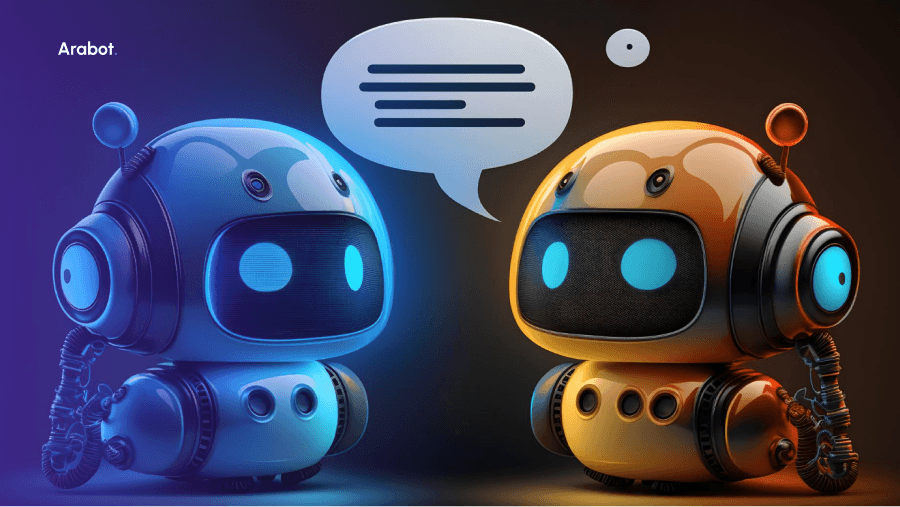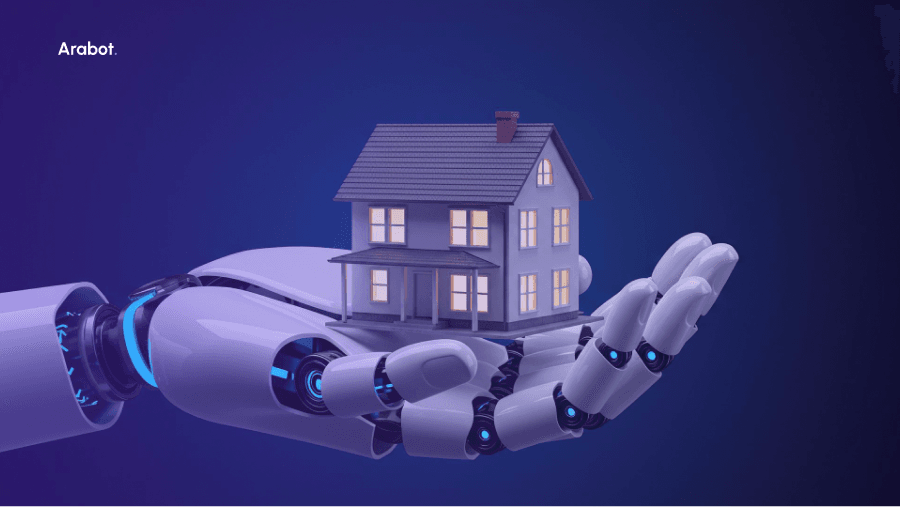- 1.
Understanding AI Agents and Chatbots
- 2.
AI Agents: Definition and Key Features
- 3.
Chatbots: Definition and Key Features
- 4.
The Key Differences
- 5.
The Similarities
- 6.
The Complementary Nature of AI Agents and Chatbots
- 7.
Choosing Between AI Agents and Chatbots
- 8.
Factors to Consider
- 9.
Strategic Implications
- 10.
How arabot Can Help
- 11.
Easy Bot Builder and Ready Templates
- 12.
WhatsApp Automation
- 13.
Multi-lingual Support
- 14.
Live Agent Integrations
AI Automation
AI Chatbot vs AI Agent: The Similarities and Differences You Need to Know

AI is changing how we talk to customers, making things faster and smarter. The market for AI in customer service is booming, set to reach $14 billion by 2025 (Accenture). This shows just how much businesses are getting on board with AI tech.
There are two main players in this AI race: AI agents and chatbots. They both help with customer service but in different ways. AI agents are like the next level; they use smart AI to have more natural conversations and can even learn from them. Chatbots are simpler, sticking to a script to answer common questions.
Let’s look closely at both AI agents and chatbots. We'll explore what sets them apart and what they have in common. This will help businesses figure out which one fits their needs best as they step into the future of customer service.
AI Agents: Definition and Key Features
AI agents are like the smart assistants of the digital world. They use something called generative AI, along with big databases of language (LLMs), and the ability to process human language (NLP). This mix lets them understand what we're saying, not just the words, but the meaning behind them.
What makes AI agents stand out? They get the context. Imagine talking to someone who remembers not just what you said a minute ago but can also guess what you might need next. That's an AI agent for you. They tailor their responses to fit each conversation and learn from every interaction. So, the more you chat with them, the better they get at helping you. It's like having a service that gets more personalized every time you use it.
Chatbots: Definition and Key Features
Chatbots are like the helpful robots of customer service. They're designed to follow specific rules. This means they can answer questions or perform tasks based on a set list of instructions they’ve been given.
What do chatbots do? They're great at handling the basics. Need to know the store hours or track an order? A chatbot has you covered with quick, preset answers. They shine in giving fast responses to frequently asked questions (FAQs), carrying out simple tasks, and providing customer support for common issues. It's like having a go-to guide for all the usual things customers might need help with.
Conversational Capabilities
When it comes to chatting, AI agents and chatbots play in different leagues. AI agents can handle complex conversations, almost like talking to a human. They understand not just the words, but what you really mean, and can keep up with the chat as it shifts topic. Chatbots, however, stick to a script. If you ask something off-script, they might not keep up.
Personalization and Learning
AI agents learn from every chat. They remember past conversations, making each interaction more personalized. It's like they get to know you better each time. Chatbots, though, don't learn or remember. They give the same responses every time, so the conversation feels more generic and less tailored to you.
Integration and Scalability
Both AI agents and chatbots can be part of a business's operations, but in different ways. AI agents can grow with your needs, getting smarter and more helpful as they learn. This makes them a good fit for businesses looking to scale up. Chatbots are easier to start with but might need updates and changes to handle more tasks or questions as a business grows.
Operational Efficiency and Maintenance
Setting up and keeping AI agents running smoothly involves some tech know-how, as they're complex systems that learn and evolve. But, they can reduce the workload over time by handling a wider range of questions. Chatbots are simpler to launch and maintain, but they might need regular updates to their scripts to stay helpful, especially as your business or products change.
Enhancing Customer Service
Both AI agents and chatbots share a common goal: to make customer service better. They do this by being available any time of the day or night, making sure customers can get help whenever they need it. This constant availability boosts customer service efficiency and ensures that help is always just a message away.
Automation of Repetitive Tasks
Another thing AI agents and chatbots have in common is their ability to take over repetitive tasks. They can handle the routine questions like "What are your opening hours?" or "How do I track my order?" This automation means that the human customer service team can focus on the tougher questions and issues, making the whole service operation more efficient.
Practical Applications
Both AI agents and chatbots have carved out important roles in modern business operations. Let’s look at how they’re being put to use in different sectors, focusing on their impact rather than specific case studies.
AI Agents: Making Personal Connections
- Healthcare Scheduling and Follow-Ups: In healthcare, AI agents are being used to help patients book appointments and receive follow-up care instructions. By understanding individual patient needs and previous interactions, these AI agents can offer personalized advice, such as reminding a patient to take medication or schedule a follow-up test.
- Personalized Banking Experience: Banks use AI agents to offer personalized financial advice. Unlike generic chatbots, these AI agents can analyze a customer’s spending habits and provide customized savings tips or recommend specific banking products that fit the customer's profile.
Chatbots: Streamlining Customer Service
- Retail Customer Support: E-commerce platforms often deploy chatbots to answer common customer questions quickly. From tracking orders to processing returns, chatbots in retail help customers get the information they need without waiting for a human representative.
- FAQs in Telecommunications: Telecom companies use chatbots on their websites and mobile apps to answer FAQs. Whether it’s querying data plans or troubleshooting service issues, chatbots provide instant responses that guide customers to solutions.
The Complementary Nature of AI Agents and Chatbots
While AI agents and chatbots serve distinct purposes, their applications often overlap in providing enhanced customer service. For instance, a business might use a chatbot to handle initial customer inquiries efficiently. If the conversation requires deeper understanding or personalization, it could then seamlessly transition to an AI agent capable of more nuanced engagement. This tandem approach leverages the speed and efficiency of chatbots with the personal touch of AI agents, ensuring customer inquiries are handled effectively across the board.
In this way, businesses across sectors—from healthcare and banking to retail and telecommunications—are discovering the unique strengths of both technologies. By choosing the right tool for the right task, they’re able to improve customer satisfaction, streamline operations, and tailor services to individual needs.
Choosing Between AI Agents and Chatbots
Deciding whether to implement an AI agent or a chatbot into your customer service strategy boils down to a few critical factors. Understanding these can help align your choice with your business goals and customer needs.
Factors to Consider
- Customer Service Complexity: If your customer service involves complex queries that require understanding context or providing customized responses, AI agents might be the way to go. They're designed to handle nuanced conversations. For simpler, more straightforward queries, chatbots can efficiently do the job.
- Personalization Needs: If personalizing customer interactions is a priority—offering advice or solutions based on previous interactions or customer preferences—AI agents have the edge. Their ability to learn from data makes them adept at personalization. Chatbots, however, are better suited for general inquiries where personalization is not critical.
- Operational Capacity: Consider your team's capacity to set up and maintain these technologies. AI agents might require more initial investment and a skilled team to manage their learning capabilities. Chatbots can be simpler to implement and maintain, making them a good option for businesses with limited technical resources.
Strategic Implications
Choosing between an AI agent and a chatbot has significant strategic implications for your business:
- Customer Satisfaction: AI agents, with their ability to engage in more human-like conversations and understand complex needs, can significantly enhance customer satisfaction. They provide a level of interaction that feels more personal and responsive. Chatbots can ensure customers receive instant responses, which is also crucial for satisfaction but might lack the depth that some customers seek.
- Brand Reputation: The technology you choose reflects on your brand. Using AI agents can position your brand as innovative and customer-centric, especially if personalized and intelligent customer service is part of your brand identity. Chatbots can bolster your reputation for efficiency and 24/7 availability.
- Long-term Scalability: Think about the future. AI agents offer scalability in terms of the quality of interactions—they get smarter over time. Chatbots offer scalability in handling a large volume of interactions. Depending on your growth strategy, one may align better with your long-term goals than the other.
Making the right choice involves weighing these factors against your business objectives, customer service goals, and resource capabilities. Whether it's the depth and personalization of AI agents or the efficiency and simplicity of chatbots, the decision should enhance your ability to meet your customers' needs effectively.
How arabot Can Help
Arabot stands out as a versatile platform tailored for businesses keen on optimizing customer interactions through AI agents and chatbots. Here’s how:
Easy Bot Builder and Ready Templates
The platform’s easy-to-use bot builder and pre-made templates for various industries—like lead generation and real estate—make it straightforward to deploy chatbots quickly. This is crucial for businesses aiming to start instantly, without the hassle of coding or long development times.
WhatsApp Automation
Given the ubiquity of WhatsApp as a communication channel, arabot’s WhatsApp Automation allows businesses to meet customers on their preferred platform. This ensures that customer interactions are not just automated but also personalized and accessible 24/7.
Multi-lingual Support
With support for over 100 languages, arabot ensures businesses can cater to a global audience without language barriers, making it easier to deliver personalized customer service across diverse customer bases.
Live Agent Integrations
Arabot’s seamless integration with live agents bridges the gap between automated responses and the need for human intervention. This feature is essential for businesses looking to balance efficiency with personalized customer care, ensuring customers receive the right level of support at every interaction.
Reach out now to see how arabot can fulfill your business needs!
© 2016 - 2026 copyright Arabot. All rights reserved.
 Insurance
Insurance Healthcare
Healthcare Automative
Automative Hospitality
Hospitality Banking
Banking Government
Government Telecommunication
Telecommunication Education
Education Human Resources
Human Resources
